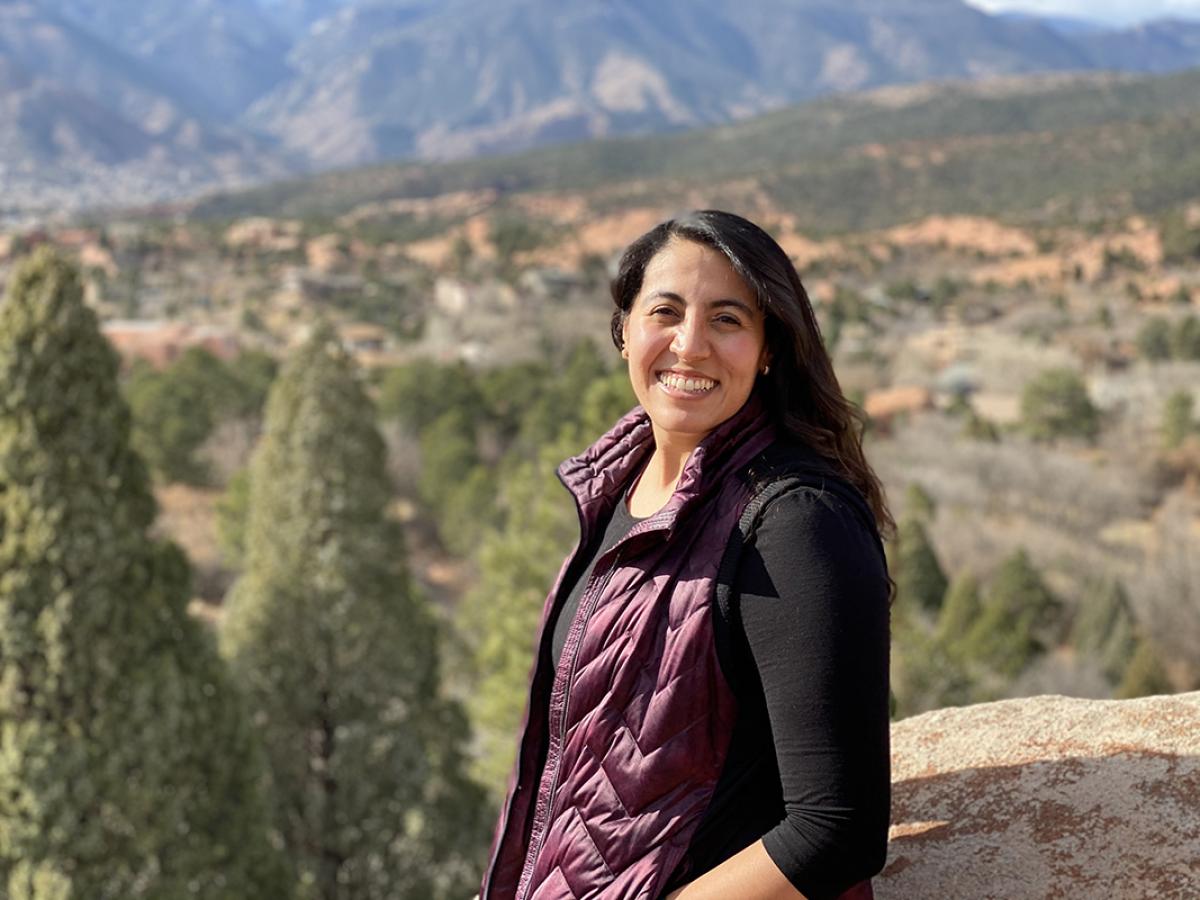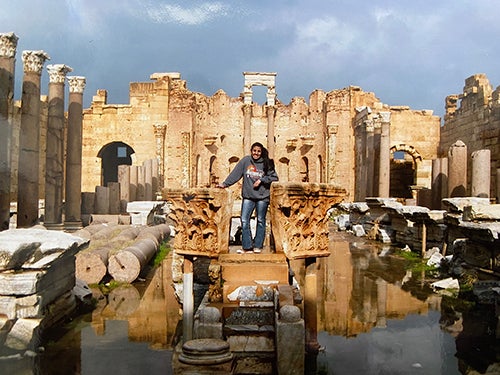Celebrating Arab American Heritage Month with Neda Kikhia

The University of Denver is committed to living our values of diversity and inclusion. We recognize that our community and institutional success is dependent on how well we engage and embrace the rich diversity of our faculty, staff, administrators, students and alumni. With that shared value in mind, throughout this academic year, we plan to publish a series of articles to celebrate cultural and ethnic heritage months. In partnership with Human Resources & Inclusive Community and the Staff of Color Association (SOCA), we will feature a staff or faculty member in recognition of each heritage month, along with an event to honor one another and learn about our unique differences.
When Neda Kikhia thinks about family, warmth and her identity, she thinks of Libya — the country where her parents were born and where she’s spent many summers basking in the humidity of the Mediterranean, visiting both current family and historical familial sites, and some of the world’s most impressive Roman ruins.
Kikhia (BA ’16, MA ’21), who serves as DU DialogUes program manager in Student Affairs and Inclusive Excellence, explains that even though her parents left Libya because of a brutal dictatorship, they were determined to help her maintain strong ties to her heritage and extended family.
Indeed, Kikhia says that her experiences as an American, a Libyan, an Arab and a Muslim have shaped her values, her attitude toward social justice work, and her drive to understand the different perspectives and experiences of being human.
“It is our job and our duty to know one another and to come together not in spite of, but because of those differences,” she says. “We’re all put on this world — different tribes, different tongues, different sizes — to get to know one another.”
In celebration of Arab American Heritage Month, Kikhia spoke with the DU Newsroom about her community work, her experience as an Arab American and her inspirations. The conversation has been edited for length and clarity.
Can you share a bit about your work with DU DialogUes and what you hope to accomplish through that work?
Our focus on campus is to do dialogues in a way that students can actually get to know one another across difference and build community. Our slogan is “more than just talk” because dialogues without action are actually more harmful for our most marginalized community members. So for us, the balance that we walk is not just doing dialogue for dialogue’s sake and not stopping at the talking. It can be something as simple as: “By the time that I leave, now there’s somebody else that I can wave to on campus.” Or: “Now I walked away realizing there’s a whole other realm or a whole other perspective to something that I didn’t once understand.
You’re passionate about community engagement and its potential to initiate sustainable change. In what ways have you seen that work? And what changes do you hope to see in your community?
For me, [I think about] my experience of being Libyan American. Libya is a majority Muslim country and culture, which not all the Arab world is. In the U.S., [a track record of] religious persecution is always at the forefront of my mind and especially the ways that that impacts my family specifically. We can see that in how Libya was one of the original countries of the Muslim ban, which was constitutionally upheld by the Supreme Court and recently lifted by President Biden.
I do a lot of work outside of DU with Muslim Youth for Positive Impact. It’s a Colorado organization started a few years ago by women and girls who wanted to make the space to come together and connect on issues that were uniquely American Muslim. And when I think about community engagement, for me it’s not only engaging our BIPOC communities at face value. It also needs to be the mix of identities that we bring to that, one of those being our youth of color, another being religious diversity. I spend a lot of my time focusing on that group of people, because they’re also my hope.
And I’m actually going to start, God willing, a leadership cohort with our Muslim youth. When we can understand what the issues are, who we are as people and how our identities impact the way that we show up in our communities, then we can develop collective solutions and address our current situations.
You moderated DU’s Arab American Heritage Month event earlier this month. What did you share in that space, and what did others share in that conversation that you considered really impactful?
My heart is so full from that, because the countries represented there were Syria, Palestine, Egypt and Libya. Yes, we’re all Arab, but we all have very different understandings of what it means to be Arab rooted in those cultures and subcultures, as well as in our American identities. We had such powerful people come together and talk about the beauty of what it means to be Arab to them — and not get stuck in having to clarify stereotypes or having to inform a very uneducated or miseducated Western culture [about] Arabs and our cultures. Living life as a representative of a people is exhausting. So to have a space where we could just laugh and share, it’s just so humanizing.
Why is it important to you to have these conversations?
Some people can just move through life without having to think twice about it, because that’s the way that society has been built for them. And for others, it’s having to justify or having to wave their hands back and forth and be like, “Hey, I’m here, I’m human,” and that is not OK. And to have to do that again and again and again takes away from their humanity. So, I think what is so powerful about these conversations is being able to see the fullness of someone when we’re able to check our stereotypes or check our biases or check our assumptions. When we’re able to actually talk about heritage and we’re actually able to talk about inclusion, we’re able to bring our full selves to those conversations.
So how have your culture, your Libyan heritage, your Arab American heritage and your experiences shaped you?
I am just so proud to have all of these pieces be a part of who I am. I know some folks struggle, and at points in my life, I’ve definitely struggled to navigate that and to be in that space. All of these pieces inform who I am, and it brings me a level of empathy and it brings me a level of deep intellect and knowledge that I think you can only have by experience. To live it and to negotiate it and to continue to face it and learn how to adapt, has really impacted who I am. And it’s part of my culture and my faith and my heritage to get to know others and to live my life in a way that brings about peace, in a way that brings about softness.
I hope that anybody reading, whether you’re Arab American or otherwise, just know that all of those pieces that our U.S. society, culture and people tell you make you not enough are actually what makes you much more beautiful. Stand in that, be proud of that, embrace that.
Who has inspired you to be the human that you are and do the work that you do?
One is my mom, and that is not just because she’s my mom. I can’t imagine what it would be like to literally give up your home, give up your family, give up your people, to leave everything you know and go to a foreign place that doesn’t fully see you and that will always see you as different, whether that’s because of her accent, because of the headscarf that she wears or because of the color of her skin. To see [what] she’s navigated and [how she] still holds steadfast in her identities and her beliefs and her family values, and seeing the amount of sacrifice that my mom has given, inspires me. She also gives the best hugs in the world. I mean that so deeply. Mama’s hugs are no joke.
The other person is Ryan Hanschen. He is my friend, he is a mentor, and he was a past supervisor. He is just somebody who inspires me deeply, and I have very rarely seen community engagement done the way that that man does it. He has really taught me what it means to be in a community, to show up for people and to just love the hell out of people.
Is there anything we haven’t talked about that you want to be sure to get across?
Arab Americans are no less American than anyone else. Instead, I think that they, like many groups, have had to learn to navigate a very interesting space in the U.S., [a space] that makes them even more American sometimes. They have and will continue to contribute so much to the fabric of the society. I would hope that anybody reading would just leave with the understanding that to be Arab is to be from a great, great group of people who continue to navigate some of the hardest conflicts in the world.
Watch a recording of DU's Arab American Heritage Month event, moderated by Neda Kikhia, here.
View a website Kikhia made covering the rhetoric and coverage surrounding the Muslim ban here.









